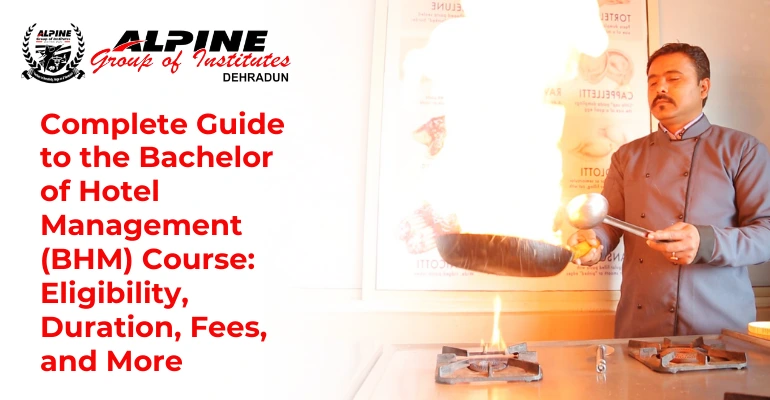Complete Guide to the Bachelor of Hotel Management (BHM) Course: Eligibility, Duration, Fees, and More
2024-12-16 8:07Complete Guide to the Bachelor of Hotel Management (BHM) Course: Eligibility, Duration, Fees, and More

Complete Guide to the Bachelor of Hotel Management (BHM) Course: Eligibility, Duration, Fees, and More
The Bachelor of Hotel Management (BHM) course is designed for students who are passionate about the hospitality industry and are looking to pursue a career in hotel and restaurant management, event planning, travel, and tourism. It’s a comprehensive program that equips students with the knowledge, skills, and practical experience necessary to succeed in this dynamic sector.
1. What is a Bachelor of Hotel Management (BHM) Course?
A BHM degree focuses on preparing students for management roles in the hospitality industry. The course includes subjects like food and beverage management, front-office operations, human resources management, event management, marketing, accounting, and customer service. The program also includes practical training through internships and industrial exposure, ensuring that students gain hands-on experience in the industry.
By the end of the course, students are well-equipped to manage operations in hotels, resorts, restaurants, and other hospitality-related businesses.
2. Eligibility Criteria for BHM
To pursue a Bachelor of Hotel Management degree, certain eligibility criteria need to be met:
- Educational Qualification:
- You must have completed 10+2 (high school) from a recognized board with a minimum aggregate score (typically 50%-60%, though it may vary by institution).
- Some institutes may require candidates to have studied subjects like English, Mathematics, or Economics at the school level.
- Entrance Exams:
- Many top institutions conduct entrance exams for admission into the BHM program. These exams typically test your general knowledge, reasoning abilities, and English proficiency.
- Some well-known entrance exams for BHM include NCHM JEE (National Council for Hotel Management Joint Entrance Exam), IHM Entrance Exam, and AIHMCT (All India Hotel Management and Catering Technology).
- Age Limit:
- Generally, there is no strict age limit for BHM programs, but some colleges may set an age range (usually 17-25 years) for admission.
- Additional Requirements:
- Some institutions may also require candidates to clear a personal interview or group discussion as part of the admission process.
3. Duration of BHM Course
The Bachelor of Hotel Management course typically spans 3 to 4 years.
- 3-Year Program: This is the most common structure, focusing on both theoretical and practical aspects of hospitality management.
- 4-Year Program: Some universities offer a 4-year program that may include a mandatory internship or additional specialization modules.
The course is divided into semesters, and students are required to complete various assessments, practical training, and a final project or dissertation.
4. Course Structure and Subjects
The BHM curriculum is designed to provide a broad understanding of the hospitality industry and includes a mix of theoretical knowledge and practical experience. Some common subjects in the course include:
- Introduction to Hospitality Industry
- Food and Beverage Management
- Front Office Management
- Housekeeping Management
- Hotel Accounting
- Human Resource Management in Hospitality
- Marketing and Sales in Hospitality
- Tourism and Travel Management
- Catering Science
- Hotel Law and Business Ethics
- Event Management
- Hotel Operations and Management
- Strategic Management
Additionally, the course includes internships, where students work in real-world hotel settings, gaining valuable practical experience.
5. Fee Structure for BHM
The fee structure for the BHM course can vary based on the institution, its location, and whether it is a government or private college. However, the average fee range is as follows:
- Government Institutions: Fees typically range from ₹50,000 to ₹2,00,000 per year.
- Private Institutions: The fees for private institutions can be higher, ranging from ₹1,00,000 to ₹4,00,000 per year.
Apart from the tuition fees, students may also need to bear additional costs for:
- Hostel Accommodation (if applicable)
- Study Materials and Books
- Exam Fees
- Internship-related Expenses
Some top institutions may also offer scholarships or financial aid to deserving students, reducing the financial burden.
6. Career Prospects After BHM
Graduates of the BHM program can pursue a wide range of career paths in the hospitality industry, including:
- Hotel Management (e.g., General Manager, Front Office Manager, Housekeeping Manager)
- Event Planning and Management
- Food and Beverage Management
- Restaurant Management
- Travel and Tourism (e.g., Travel Agent, Tour Operator)
- Cruise Line Management
- Marketing and Sales in Hospitality
- Hospitality Consulting
- Entrepreneurship (opening a restaurant, hotel, or event planning business)
Job Roles and Salary Expectations:
- Hotel Manager: ₹4,00,000 to ₹10,00,000 per annum
- Event Manager: ₹3,00,000 to ₹6,00,000 per annum
- Food and Beverage Manager: ₹4,00,000 to ₹8,00,000 per annum
- Tourism Manager: ₹3,50,000 to ₹7,00,000 per annum
- Cruise Line Officer: ₹3,00,000 to ₹6,00,000 per annum
Salaries can vary significantly depending on the role, location, and level of experience. As you gain experience, your salary potential increases, especially if you take on managerial or executive positions.
7. Top Institutes Offering BHM in India and Abroad
Several renowned institutes offer BHM courses, some of the top ones include:
In India:
- Institute of Hotel Management (IHM) – Delhi, Mumbai, Bangalore, Kolkata
- Ecole hôtelière de Lausanne (EHL) – Mumbai campus
- The Oberoi Centre of Learning and Development – Delhi
- Welcomgroup Graduate School of Hotel Administration (WGSHA) – Manipal
- Christ University – Bangalore
International Options:
- Ecole hôtelière de Lausanne (Switzerland)
- University of Nevada (USA)
- Glion Institute of Higher Education (Switzerland)
- Les Roches International School of Hotel Management (Switzerland)
- University of Surrey (UK)
These institutions offer excellent infrastructure, experienced faculty, and robust industry connections that can help students land promising job opportunities in the hospitality industry.
8. Why Choose BHM?
A Bachelor of Hotel Management degree opens the doors to a dynamic and fast-growing industry. The hospitality sector is expected to continue growing, driven by increased global travel, the rise of experiential tourism, and the expansion of luxury and boutique hotels.
By completing the BHM program, you’ll gain valuable skills such as:
- Leadership and Team Management
- Customer Service Excellence
- Crisis Management
- Financial and Operational Management
- Cultural Sensitivity and Global Awareness
Additionally, the global nature of the hospitality industry offers numerous international career opportunities for BHM graduates.
Conclusion
The Bachelor of Hotel Management (BHM) course offers an exciting pathway into the hospitality industry, with ample opportunities for growth and career advancement. By meeting the eligibility criteria, gaining practical experience, and leveraging industry connections, BHM graduates can look forward to a rewarding career in hotel management, event planning, restaurant operations, tourism, and more.
Whether you want to manage a luxury hotel, plan a corporate event, or start your own hospitality business, the BHM course provides you with the foundation to succeed in this vibrant industry. So, if you’re passionate about hospitality and ready to take on new challenges, pursuing a BHM degree could be your ticket to a fulfilling career!






